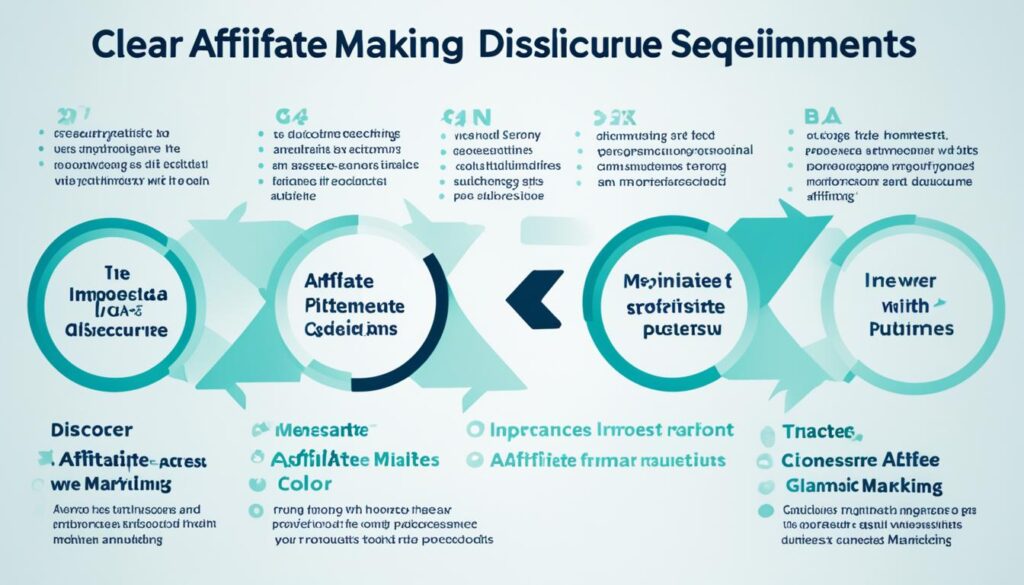Physical Address
304 North Cardinal St.
Dorchester Center, MA 02124
Physical Address
304 North Cardinal St.
Dorchester Center, MA 02124

Understand legal requirements for affiliate marketing to avoid penalties and ensure compliance with FTC, data privacy, advertising guidelines, and tax laws.
Did you know the California Online Privacy Protection Act (CalOPPA) dates back to 2004? This law began the journey for affiliate marketing and focused on data privacy. As time went on, the rules and guidelines got more complex. This made it important for affiliate marketers to follow them to succeed.
Welcome to our guide on dealing with affiliate marketing’s legal aspects! Staying on top of the law is key for a solid affiliate marketing plan. We’ll talk about what you need to know, like being transparent, keeping data safe, following good practices, and the risks of not playing by the rules. By understanding all this, affiliate marketers can form lasting bonds with customers, safeguard their brands, and find success in the field.
Affiliate marketers play a key role in the online world. They create and share content. They must be honest and follow the legal practices. This is essential for a good name and success in their business.
To do well in affiliate marketing, you need to know the rules well. This means knowing about disclosure requirements and trademark policies. Also, understanding advertising rules and FTC compliance matters. The laws on privacy also affect what you can do.
Affiliate success relies heavily on consumer trust. Following legal contracts and international laws helps build strong, honest partnerships. These are key not just for making money, but for lasting success too.
To stay on the right side of the law, affiliate marketers must use best practices. They should update their terms of use and privacy policies regularly. Being truthful in recommendations matters. They must also keep up with new legal requirements and tax implications.
Being open is key in affiliate marketing success. It builds consumer trust and follows the law. As marketers, it’s our job to clearly show our affiliate relationships.
The Federal Trade Commission (FTC) says we must clearly mention our affiliate relationships. If we don’t, we could face legal issues and lose our good name. Sharing this with the public isn’t just a rule; it shows our honesty and builds trust with buyers.
In the US, FTC rules say we have to talk about any money that might make us favor one product over another. If we don’t talk about it, we could be fined. Also, on places like Reddit, we must clearly say when something is an affiliate link. This can stop our posts from being removed or our accounts from being banned.

Following data privacy laws, like the General Data Protection Regulation (GDPR), means we must be open about how we collect data. Sharing this information is not just about the law. It’s about being fair, keeping trust with our customers, and creating strong relationships with them.
Affiliate marketers are key in gathering and using consumer data. It’s vital that they focus on data privacy and security. The General Data Protection Regulation (GDPR) has changed how businesses deal with personal data. This includes those in affiliate marketing.
Marketers must follow GDPR rules to keep consumer data safe. This means aligning data collection with what the law says.
Since May 2018, the GDPR has been in place to protect the personal data of EU citizens. This includes rules for businesses and affiliate marketers. They must get user consent before collecting personal info.
Marketers need to clearly state why they are collecting data. They must also tell users what kind of data is being collected. Plus, they have to give users a choice to opt-in or opt-out of sharing their data. It is also their job to keep data safe.
Marketers should collect only necessary data for their work due to GDPR. Users have rights over their personal info. They can access, correct, and even delete their data. Plus, they can object to some ways their data is being used.
When sharing data with third parties, marketers must get permission. They also need the right agreements in place. Handling data correctly means being clear with users, updating policies, and keeping data safe.
The GDPR and similar laws like the California Consumer Privacy Act (CCPA) push for clear user consent and privacy. This can improve trust and the user’s experience. But it also adds complexity and costs for marketers.
Legal Considerations in Affiliate Marketing are very important. It’s crucial to follow the rules and guidelines to achieve long-term success. This means knowing and using the disclosure requirements. By doing this, affiliate marketers make sure they’re within the law and honest with their audience.
Making terms of use and privacy policies makes sure everything is clear. It states what’s expected from the marketer and the customer. These policies help keep things honest and open. Marketers should also clearly explain their trademark policies, advertising guidelines, and data privacy laws. They need to follow FTC compliance rules to the letter.
The FTC wants endorsements to be real and clear. This means no trickery. Marketers need to openly say if they’re tied to the product. They should do this on their blogs, social media, and in reviews. Being clear builds trust and keeps you out of trouble with the law and taxes.

| Best Practice | Description |
|---|---|
| Transparent Disclosure | Tell people about your affiliate deals in your ads to keep up with the FTC regulations. |
| Honest Endorsements | Give real, honest reviews that show what it’s really like to use the product or service. |
| Comprehensive Policies | Make detailed terms of use and privacy policies that meet data privacy laws and standards. |
| Ongoing Compliance Monitoring | Always check your affiliate marketing to make sure it’s up-to-date with the law and rules. |
To be successful and keep their good name, affiliate marketers must know the laws. These laws include legal regulations and compliance guidelines. Knowing them helps to create a affiliate marketing strategy that meets legal standards. This ensures success and keeps the reputation of affiliate marketers safe.
The California Online Privacy Protection Act (CalOPPA), made in 2004 by the California Attorney General’s Office, is a must for any business that deals with personal info from California residents. The General Data Protection Regulation (GDPR) sets data protection rules all companies dealing with EU citizens must follow. And Canada’s Personal Information Protection and Electronic Documents Act (PIPEDA) sees that personal info is collected the right and legal way.
A lot of personal info is gathered by affiliate marketers from customers. This includes names, contact details, customer profiles, buying histories, and records of communication. Having this data helps marketers understand and reach their customers well. It also helps them see how well their affiliate marketing efforts are doing.
To follow affiliate marketing laws, marketers must do several things. These include being open about their experience as affiliates, showing any business connection, using specific affiliate disclosure language, and putting their disclosure in the right place. Not following these rules can lead to big problems, like criminal penalties, fines, and being banned from promoting the brand.
Dealing with the legal side of affiliate marketing is key to succeeding long-term and keeping your good name. Affiliate marketers must know and stick to a lot of laws and rules. These cover things like disclosure requirements, data privacy, and advertising guidelines. Sticking to these laws helps build a legal, successful affiliate marketing business.
Affiliate marketing at its core involves one party influencing another to buy a product. Trust is key, and a Privacy Policy is the best way to build it.
A affiliate marketing business needs a detailed Privacy Policy. It explains to customers how their personal information is dealt with. Such honesty is not just a good business practice; it’s also needed to follow data privacy laws like the GDPR and CalOPPA. This builds audience trust and credibility.
A clear Privacy Policy shows affiliate marketers care about data protection and using data responsibly. It helps them form better bonds with their audience and run a compliant and successful affiliate marketing business.

This policy also helps affiliate marketers meet legal requirements, including the FTC’s guidelines and PIPEDA in Canada. Following these laws initially stops potential penalties or harm to their reputation.
Affiliate marketers must know the laws that cover their work. Depending on where you live, laws in the United States, Canada, or the EU affect your business’s Privacy Policy. See the California Online Privacy Protection Act (CalOPPA), the General Data Protection Regulation (GDPR), and the Personal Information Protection and Electronic Documents Act (PIPEDA) for details.
CalOPPA, from 2004, focuses on consumer privacy when sharing personal info. If you gather data from California, you must follow this, no matter where your company is. Businesses need a visible Privacy Policy, explaining how they use personal information.
The European Union offers the GDPR to protect EU citizens’ personal data. It affects any business handling EU citizens’ data, wherever they are based. Companies must tell how they use data, get clear consent, and secure data well.
In Canada, PIPEDA controls private organizations’ handling of personal data in trade. Companies there must legally and fairly manage personal information. This law aims to protect the privacy of Canadians.
Sticking to these laws helps marketers do right by the law and their audience. Following them not only safeguards consumers but also boosts a marketer’s brand trust and reputation.

Affiliate marketers gather personal info from customers. This includes names and contacts, profiles, what they buy, and communication. It lets them know their customers better. This way, they can aim their ads precisely and see if their ads work well.
Marketers get basic contact info like names, emails, and phone numbers. This data lets marketers keep in touch with their customers. They can offer things that match what their customers want. Plus, it keeps their actions honest and clear.
They also find out about customers’ lives, likes, and shopping. This info helps make personal ads. Ads that are just for the customer are more likely to lead to a sale. And customers will be happier because they get what they like.
Knowing what customers have bought before, and how they shop, is key. It helps marketers see how well their ads are doing. They can then decide how to do better in the future.
They save their talks with customers, like emails or chats. This history can make the customer’s next talk with them better. They can also see what they should do better. Plus, it helps them follow privacy rules.
Understanding the info they gather lets them do their marketing better. They can create ads that really speak to the customer. And they can create a bond with the customer that lasts. All this must be done in the right way. They need to follow the law and protect what they know about their customers.
Affiliate marketers must tell you when they use affiliate links. This rule is from the Federal Trade Commission (FTC). It keeps things honest in the world of affiliate marketing. The law says the connection between the marketer and the company must be very clear. This includes any payment, freebies, or both.
The FTC also insists on a disclaimer for these links. You’ll see terms like “Paid ad” or #Paid, “Ad” or #Ad, “Sponsored” or #Sponsored in posts or blogs. The disclaimer must be easy to see and close to what it’s about. Not doing this can lead to big trouble, like fines, and losing the right to promote the brand.
Affiliate marketing is, without a doubt, legimitate. It falls within the law. Yet, like all industries, it has rules to follow. This includes knowing and sticking to affiliate marketing rules, disclosure needs, trademark rules, ad guidelines, FTC laws, data privacy acts, tax effects, and worldwide statutes.
Maintaining legal standings in affiliate marketing means being well-informed. This involves knowing about various legal agreements and rules. Marketers must be clear with their disclosures and comply with data privacy laws such as GDPR and PIPEDA. They should also heed ad guidelines provided by agencies like the FTC.
Committing to transparency, honesty, and authenticity is key. Affiliate marketers can win over their audience by gaining trust. They can also work within legal limits.
| Legislation | Overview |
|---|---|
| CalOPPA | The California Online Privacy Protection Act, launched in 2004, is for businesses worldwide that gather personal info from Californians. |
| GDPR | The General Data Protection Regulation, formed by the EU, empowers EU citizens with rights over their personal data. |
| PIPEDA | PIPEDA guards personal data, under a federal law in Canada. It’s for private Canadian organizations. |
To stay on the right side of the law, affiliate marketers need to stay informed. They should act early, by adopting compliance strategies. This way, they can manage their marketing endeavors within the law.
To keep legal compliance in affiliate marketing, marketers need to follow some important rules. They should make sure their partnerships and promotions are clear, honest, and real.
Affiliate marketers should honestly talk about their experience with the products or services they promote. They can’t lie or be misleading about what the products do or how good they are.
Marketers have to show if they have any special relationship with the brands they talk about. This includes getting money, free stuff, or any other type of payment. It’s all about being open and making the audience trust them.
The way they tell us they’re working with a brand must be very clear. Things like “Paid ad,” “Sponsored,” or hashtags like “#Ad” work. They have to use these on social media, blogs, and emails.
Where the disclosure is placed matters too. It has to be close to the promotion or claim. This lets people know, without a doubt, that there’s a connection between the marketer and the brand.
If they don’t follow these rules, there could be serious consequences. Both the marketers and the brands they work with could get in trouble. Being clear, honest, and real is key in affiliate marketing. It helps build trust and makes sure everyone keeps following the rules.
Not following legal considerations in affiliate marketing has serious results. Those who ignore disclosure requirements, advertising guidelines, and data privacy laws can face big fines or even get in legal trouble. They might lose the right to keep working with certain brands.
If an affiliate marketing business doesn’t follow the rules, its reputation suffers. People want clear and honest ads online. When brands don’t do this right, customers trust them less. This can lower sales and even lead to losing some affiliate marketing deals.
Furthermore, governments are getting tougher on affiliate marketing that harms consumers. Tricks like URL hijacking, cookie stuffing, and click spam can end in big fines and maybe even court. It’s vital for affiliate marketers to keep an eye on the law to avoid these dangers and keep their business running well and ethically.
| Consequence | Impact |
|---|---|
| Criminal Penalties | Fines, imprisonment, and loss of business rights |
| Regulatory Fines | Monetary penalties from government agencies and industry regulators |
| Terminated Partnerships | Brands may sever ties with non-compliant affiliate marketers |
| Reputation Damage | Loss of consumer trust and credibility, leading to decreased engagement and sales |
| Legal Action | Lawsuits, class-action suits, and other legal consequences for violating laws and regulations |
Knowing the consequences and following the best practices for legal compliance can protect a marketer’s business. It helps build consumer trust and sets the path for lasting success.
In the world of affiliate marketing, understanding the rules is key. Affiliate marketers need to follow laws on disclosures, data privacy, and advertising. By knowing the law and doing the right things, they can build strong relationships with customers. This protects their brand and helps their affiliate marketing stay successful for the long term.
Sticking to the FTC guidelines, data privacy laws like GDPR, and other international laws is essential. It helps affiliate marketers keep their audience’s trust and avoid legal trouble. They should create solid terms of use and privacy policies. Also, they should check how they’re doing regularly to make sure they’re on track with the law.
Focusing on legal compliance isn’t just about avoiding risks. It’s also about showing everyone you’re a top-notch pro who values fairness and honesty. As the affiliate marketing world changes, keeping up with the law is crucial. It’s how you keep your good name with customers and sellers alike over the years.